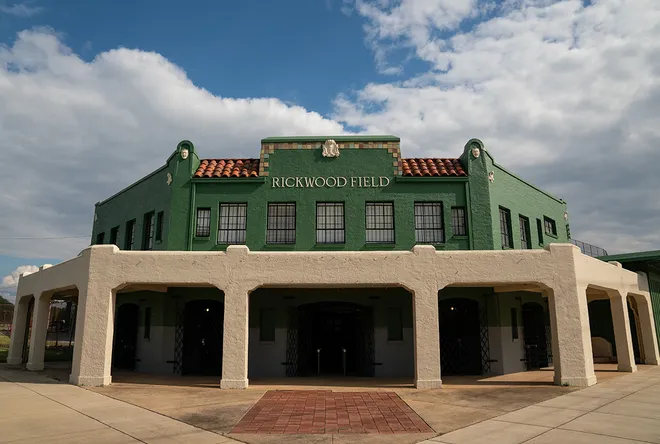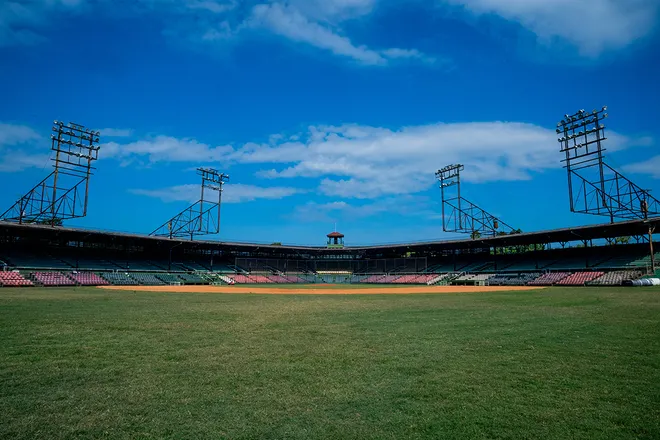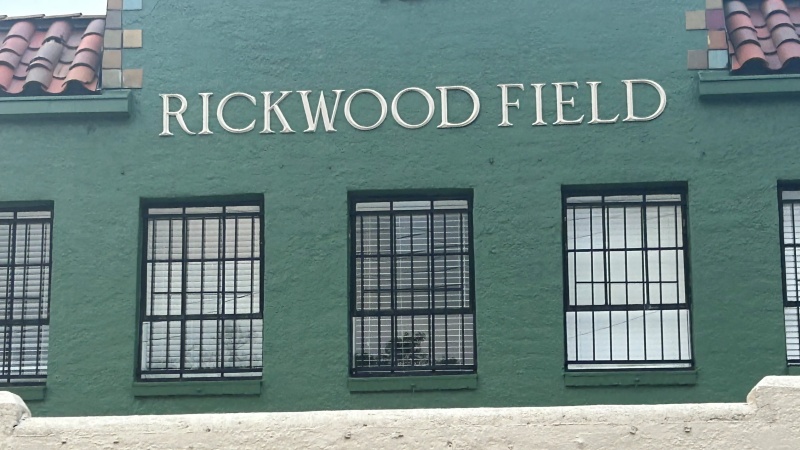Legacy of the Negro Leagues to live on during MLB game at Rickwood Field in Birmingham
BIRMINGHAM, Ala. − This is where Willie Mays was born, raised and launched his Hall of Fame baseball career.
This is where the Birmingham Black Barons played in the Negro Leagues, the only league that permitted Mays to play professionally.
This is where Martin Luther King Jr. preached at the 16th Street Baptist Church.
This is where four little girls were killed on a Sunday morning in a bombing by the Ku Klux Klan.
This is where the Civil Rights Movement crested in the most segregated city in the country.
Follow every MLB game: Latest MLB scores, stats, schedules and standings.
This is where white supremacist Bull Connor turned police dogs and high-powered fire hoses on peaceful protesters.
This is the home of 114-year-old Rickwood Field, the oldest professional baseball park in the United States, where the Black Barons played and racism could be forgotten for at least nine innings.

Now, 76 years since Mays helped lead the Black Barons to the 1948 Negro League World Series as a 17-year-old, Major League Baseball is playing its first game at Rickwood with the San Francisco Giants playing the St. Louis Cardinals at 7:15 p.m. EDT Thursday (Fox).
“This is such a blessing, I can’t believe it,’’ Rev. Bill Greason, 99, one of only two living Negro League players from 1920 to 1948 and a recipient of the Congressional Gold Medal, told USA TODAY Sports. “This is a place where I grew up, and a place where so many things happened here. Blacks were not allowed to play any place around here. Blacks weren’t allowed to do a lot of things around here. There was a rich side and a poor side. I was on the poor side.
“But here we are, all of these years later, together, celebrating history.
“Thank God I’ve been able to live this long to see it.’’
Greason will be honored by throwing out the first pitch.
Mays, who spent three years playing at Rickwood, died Tuesday after battling health issues for more than a year. Still, the pageantry will be powerful with Willie Mays’ son, Michael, on hand, along with his godson, home run champion Barry Bonds, Hall of Famers Reggie Jackson, Derek Jeter and David Ortiz and future Hall of Fame manager Dusty Baker.
The families and ancestors of those who played in the Negro Leagues from 1920-1948 will be on hand − with 10 families representing the Negro Leagues Family Alliance − and a total of 59 former Negro League players will be honored.
“This is a seminal moment in Negro League history, and in many ways, this is larger than life,’’ said Bob Kendrick, president of the Negro Leagues Baseball Museum in Kansas City. “We will have a collective eye of baseball world dedicated to salute the Negro Leagues. And to do it at Rickwood Field, a place with history so rich, a place where a young Willie Mays got his start with the Black Barons, what Henry Aaron did here, what Ernie Banks did, how they all validated the talent in the Negro Leagues.
“When these players walk onto the field, they’re going to feel the spirits of those legendary stars come back through life. That’s what made the Field of Dreams game so special in Iowa. But that was a movie with a game played on a movie set. That was a reel. This is REAL life.’’
There will be tears shed in memory of Mays, tears of the painful memories of segregation in this country and tears of euphoria with the gathering of the Negro Leagues Family Alliance, with many meeting for the first time.
“I can’t wait to meet and talk to Bill Greason,’’ said Sean Gibson, the great grandson of legendary Josh Gibson, considered the greatest player in Negro Leagues history. “He’s one of the only few living people who saw Josh Gibson play. I’ll get some good stories about Josh. I don’t get actual players who played against Josh, and now I get to pick his brain about my great grandfather.
“For me to talk to an actual person who saw my grandfather play is my highlight there.’’
Gibson, co-founder of the Negro Leagues Family Alliance with the Buck Leonard family, plans to lobby MLB officials during their luncheon Wednesday about an annual Negro Leagues Day on May 2, commemorating the start of the Negro Leagues in 1920. Deputy commissioner Dan Halem and Tony Clark, executive director of the Major League Players Association, are scheduled to speak and provide a substantial grant for the alliance.
“It’s going to be like a mini-family reunion,’’ Gibson said. “We’re celebrating this family reunion on Juneteenth and celebrate the Negro Leagues in Birmingham of all places.
“You can’t get any more history than this.’’
Oh, there be plenty of stories flowing at the brunch, from the days of Rickwood to Pittsburgh to Kansas City to Detroit to Patterson, New Jersey.
Greason, who lived across the street from Dr. Martin Luther King in Atlanta, will reminisce about the Civil Rights Movement, winning Game 7 against the Kansas City Monarchs and leading the Black Barons into the 1948 Negro League World Series, becoming the St. Louis Cardinals’ first Black pitcher, and serving two years in the Marines during World War II.
“This was greater than baseball to be at a place called Iwo Jima and to see the atomic bomb fall in Nagasaki,’’ said Greason, who still preaches every Sunday at Bethel Baptist Church. “Our life was in danger and I returned without a scratch. I lost two of my best friends. And here I am, still breathing at 99. I’m thankful to be able to live this long.
“I was blessed to play with Willie Mays, and to see Roberto Clemente, two of the greatest players I ever saw in my life.’’
Ron Teasley, 97, grew up in Detroit, played in the Negro Leagues with the New York Cubans, was signed by the Brooklyn Dodgers to play in their farm system, and met Jackie Robinson at their spring training headquarters in Vero Beach. Florida.

“My dad would take me to see those great Negro League players because we weren’t allowed to see the Detroit Tigers,’’ said Teasley, the first member of his family to attend college and graduate from Wayne State University. “You’d hear about Oscar Charleston and Josh Gibson and the way folks bragged about them. I had such great admiration for the Negro Leagues.
“What impressed me so much was the love these guys had for the game. My favorite was Buck Leonard. My father’s favorite was Turkey Stearnes. My father idolized him. He came to my house one day and my father was so overjoyed he was late for work, and he was never late for work.’’
Teasley’s father was worried when Teasley went to play baseball in the Deep South. Teasley had never been to the South, and when he arrived, was warned by his teammates to be extremely cautious.
“You were afraid when you got stopped by the police, so the players told me what to do,’’ Teasley said. “They told me you’re going to get stopped, and you better say the right terms. You better say the word 'Sir.' And they’re always going to ask you where you’re from.
“When you got stopped, you told them what you’re doing there, and they’d always say, 'Where’s Satchel Paige? Where’s Satchel?’ We’d say, 'He’s waiting for us at the ballpark.’ Everyone knew Satchel.’’
Teasley is most proud of his impact as a teacher in the world of education, while also serving in the Navy during World War II, and meeting President Barack Obama at the White House. His greatest claim to fame as a ballplayer, he says, is hitting a triple off Paige during an exhibition game at Dequindre Park in Detroit.
“I was a utility player, and I guess I knew my place when I was supposed to start one game for the Negro League Cubans,’’ Teasley said. "Well, when Minnie Minoso arrived, he did not bring his uniform. So, guess whose uniform they gave him?’’
Teasley, who never played at Rickwood, always wonders how long the Negro Leagues would have flourished if the Dodgers had not integrated baseball in 1947 with Jackie Robinson, and two months later when Cleveland signed Newark star Larry Doby.
“We were kind of concerned when he signed,’’ Teasley said, “because we knew that pretty much meant the end of the Negro Leagues. Fans stopped coming to our games. It was a happy time, but a sad time, too.’’
The Negro Leagues were never the same, but the memories will last forever, passed on to generations and generations. The Giants-Cardinals game, with players wearing Negro League jerseys, culminates a tribute to Rickwood and the Negro Leagues. This comes in the aftermath of Negro Leagues stats being formally incorporated into MLB stats with retirement benefits paid to all living players. They had Play Ball clinics for local Boys and Girls Clubs and Nike RBI programs; a symposium with financial advice for Black-owned businesses; a minor-league baseball game and a celebrity softball game filled with former stars.
Folks in Birmingham, with nearly $6 million spent in renovating Rickwood Field, are hoping this becomes an annual event. Others are hoping MLB plays this annual game in different Negro League ballparks, like refurbished Hinchliffe Stadium in Patterson, New Jersey, where Doby played or Hamtramck Stadium in the Detroit area.
There, of course, is the eternal hope that the Rickwood Game spurs interest that could lead to an increase of Black players in today’s game. It’s appalling to think there are just as many former Negro League players from 1920-1948 alive (Greason and Teasley) as active Black players who will be on the field (Masyn Winn of the Cardinals and Jordan Hicks of the Giants).

Just 5.7% of all players on opening-day rosters and injured lists this year are Black, the lowest percentage since 1955, according to USA TODAY Sports’ research.
“This is a great platform, now we’re hoping there will be a lot of change after this,’’ said Gibson, who also is advocating the MVP award named after his great grandfather. “There have been a lot of great strides made.
“Now, it’s time to see more.’’
Follow Nightengale on X: @Bnightengale
Disclaimer: The copyright of this article belongs to the original author. Reposting this article is solely for the purpose of information dissemination and does not constitute any investment advice. If there is any infringement, please contact us immediately. We will make corrections or deletions as necessary. Thank you.







